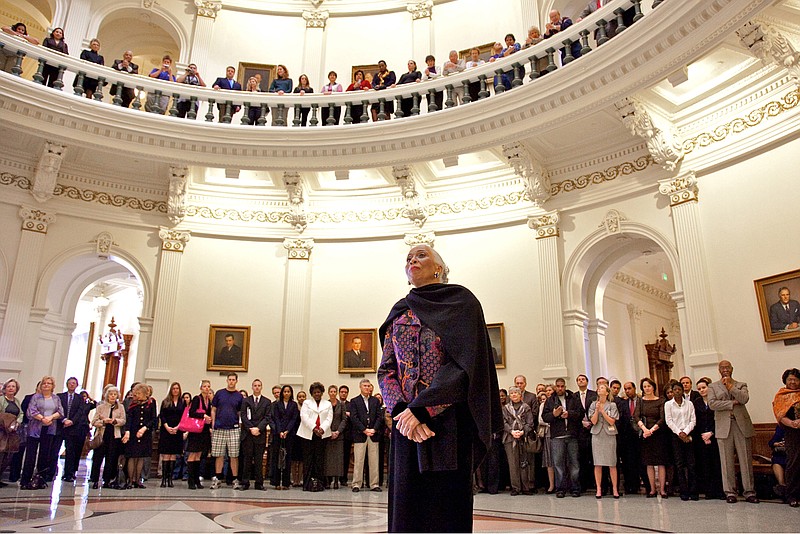If you're unfamiliar with the name Barbara Smith Conrad, that's a shame, but perhaps unsurprising.
Conrad, a mezzo-soprano who sang with the Metropolitan Opera for eight years, performed the world over and shared the stage with some of the top orchestras of her time, hasn't received the fame and local fanfare other musical luminaries from this area have-people like Scott Joplin, Conlon Nancarrow, Otis Williams, Don Henley and others.
But local Conrad surely was, having been born in Atlanta, Texas, raised in the Center Point community near Pittsburg and attended school in Queen City.
Photo Gallery
MDA Lock-Up @ Cajuns'
The Muscular Dystrophy Assoc. "locks up" a few locals to raise money for the foundation. People in jail enjoyed snacks and won prizes at Cajuns on Wednesday, August 13.
Born in 1937, she was a pioneer, too, when she headed to college, being part of the first undergraduate class of African-American students at the University of Texas.
There, in Austin, Conrad's story becomes more complex, in a way more troubled but also in another way as an exemplar of undeniable talent paired with personal fortitude and dignity.
While an undergraduate, Conrad was cast in a lead role of the university production of "Dido and Aeneas." Normally, this would be considered a great accomplishment, but in 1957 America it only highlighted a racial divide and racial injustice.
Conrad was cast as Dido, Queen of Carthage, to a classmate's Aeneas, a Trojan hero, in this Henry Purcell opera about their thwarted love, a story based on Virgil's epic Latin poem "The Aeneid," a monumental classic in the literature canon.
But the classmate was white and this bi-racial casting stirred up Texas-sized controversy, so much so that a state legislator from her district, Joe Chapman, talked with the university president about detrimental publicity, according to a Neil Abeles article that ran in the Gazette last year, the year the opera singer died.
Ultimately, Conrad was removed from the role. This startling encounter with racist backlash to her talents received attention from national publications like Time. Despite this setback, the singer continued her UT studies and went on to New York City to achieve her many successes.
It's a remarkable life story that Texarkana College will share at a 4 p.m. Tuesday screening of "When I Rise," a documentary movie about Conrad's life to be shown at the Stilwell Humanities Music Hall. This Black History Month event is part of the college's music department series.
Mary Scott Goode, one of TC's music professors, said her interest was sparked by reading the Abeles coverage of Conrad's life published in the Gazette in 2017.
That coverage includes her funeral service at Center Point Baptist Church, which was her childhood church. Center Point, according to the New York Times obit of Conrad discussed in one Abeles story, was founded by freed slaves and was an all-black community. Part of young Barbara's life was spent there.
Goode realized a documentary about Conrad's life would be the perfect sort of thing to show at TC.
"Because it would be informative, historical and it would showcase regional talent, which is what we're all about, particularly in music," Goode said. She ordered the film and watched it herself.
"And thought, this is just beautiful. This is exactly the kind of thing I want to know about and we think our students will want to know about, and this is not only a big talent but a beautiful lady inside and out," Goode said. "Dignified, a credit to the profession, a real professional, just a class act in every possible way. And what a story, what a picture of life just 60 so years ago here."
And talking about Conrad's participation in the first class of African-American undergrads at UT, Goode notes that TC would not, at the time, have welcomed her as a student.
"We could have been her college, but she wouldn't have have been allowed to enroll at Texarkana College. We weren't integrated then either," Goode said.
When Conrad, who was born Barbara Louise Smith, was cast in the role of Dido, somehow the word got out that she was opposite a white male lead, making for a mixed-race lead couple, explained Goode. In addition to Chapman, other legislators got involved.
"She is informed basically by the dean of the College of Fine Arts that for your well-being you're not going to appear in this. It makes the national news. She was experiencing threats and intimidation," Goode said. "That was kind of par for the course," she explained, referring to experiences by other black students enrolled in the university.
Goode says Conrad left school for a spell, but then went back to finish her degree at UT. Harry Belafonte offered to help her attend school elsewhere, but she remained in Austin. He helped Conrad when she went to New York City, Goode said, but she had to overcome struggles to make it there. But make it she did.
"She finally got some breaks. She was auditioning. She finally broke into the opera world and was a huge hit from then on. She sang at the Met, she sang in Europe. She had all kinds of opportunities," Goode said, noting the singer credited some of her success to her music experiences in church in Northeast Texas in Center Point.
As part of this program, TC will present musical numbers in addition to the film. Candace Taylor will perform two songs. Expect to hear "Dido's Lament," an aria that's the most famous excerpt from "Dido and Aeneas," said Goode.
"Barbara talks about it in the movie. It's this particular piece," the music professor said. She believes there's much to be gained from learning about Conrad's life.
"I think she's a wonderful role model of somebody who perseveres to achieve, perseveres first of all to get an education. She doesn't let things stop her from her goal of getting an education. She follows her dream," Goode said. "She follows her talent. She also works hard at it. Things didn't all fall in her lap. She worked hard at that. She trained in every way that she could, and that's always the message for a professional musician. You need your training. You work hard at it. And people who work hard get somewhere in life."
Also, she's an inspiration for African-Americans and students of today, Goode said.
"This is a big story. This really is a big story in every way," she said, adding of Conrad, "She was a pioneer and she was brave."
Dr. Don Carleton, executive director of the Dolph Briscoe Center for American History at UT, served as executive producer of "When I Rise," which received a premiere on the PBS series "Independent Lens" in 2011.
Looking back on Conrad's story, he sees her legacy as one of moving beyond the past to heal in the present.
"Human beings do have a capacity for healing and reconciliation and forgiveness," Carleton said.
After all, despite this controversy with theater casting, Conrad graduated in 1959 and was later named a Distinguished Alumnus in 1985 by the Texas Ex-Students Association. UT also founded the Barbara Smith Conrad Endowed Presidential Scholarship in Fine Arts, and she herself worked with the Briscoe Center to preserve papers that document her life and distinguished career as an internationally known opera singer.
"The main thing to me is really what Barbara's story means to the campus today," Carleton said. Here's a person who faced severe discrimination on campus and went from a bitter, disappointing experience to really take hold of life and persevere, he said, noting she later taught master classes at UT.
"Moving forward, these things can be done," Carleton said about healing and bringing people together despite the adversity faced in this event so typical of stories in the Civil Rights era. What can contemporary UT students learn from her life?
"We can all live together there's nothing keeping us from doing that other than ourselves," Carleton said.
The Mat Hames-directed "When I Rise" was selected for inclusion in a number of 2010 film festivals, including the South By Southwest Film Festival, Dallas International Film Festival, Hot Docs Festival, New York City International Film Festival, New Orleans Film Festival, Starz Denver Film Festival, Santa Barbara International Film Festival and Indianapolis International Film Festival.
In that way, the story of Barbara Smith Conrad has been carried forward across the country, and now it's TC's time to share it.
Goode hopes it encourages students.
"Inspiration. I hope they leave there thinking now I can do that, too. This trail that just got blazed, I can walk down that trail, too," Goode said. "I hope that people are inspired and that they bring people together."


